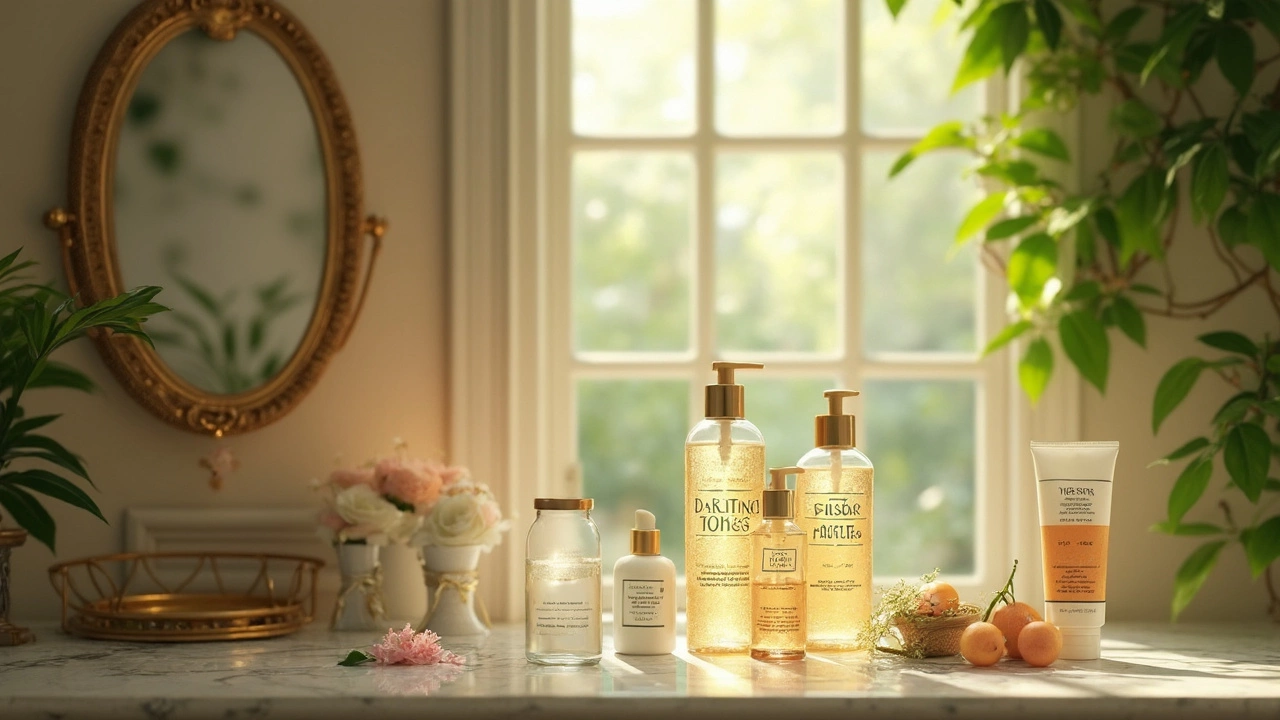Ever stare at that bottle of toner in your bathroom and wonder, 'What do you actually do for me?' You're not alone. Toner often seems like the mysterious middle step in skincare routines, but it's got some serious benefits that might surprise you.
For starters, toner helps in balancing your skin's pH levels after cleansing. Cleansers can sometimes leave your skin slightly off-kilter, and that's where toner steps in to restore order. This is especially important if you're dealing with oily or combination skin.
Besides balancing pH, toner acts as a gentle cleanser, picking up any residual dirt or makeup your regular cleanser might have missed. It's like the perfect backstage crew for your skin—quiet but effective.
- Understanding Toner: The Basics
- Benefits of Using Toner
- Choosing the Right Toner
- Tips for Incorporating Toner into Your Routine
Understanding Toner: The Basics
So, what exactly is a toner? In the world of skincare, toner is a liquid product usually applied right after cleansing and before moisturizing. It's a bit like that trusty sidekick in superhero movies—often overlooked, but totally essential.
Back in the day, toners were mainly alcohol-based, acting as astringents to tighten skin and minimize pores. While that worked for some, it wasn't ideal for everyone, often leading to dry and irritated skin. Fast forward to today, and toners have evolved. Now, they're packed with hydrating, soothing, and pH-balancing ingredients suitable for all skin types.
Balancing Act: The Role of pH
Your skin has a natural pH level of around 5.5—slightly acidic. Cleansers can sometimes disrupt this balance, leaving your skin vulnerable. That's where toner comes in, helping to restore that perfect equilibrium. A balanced pH means your skin is better equipped to handle environmental stressors and maintain a healthy barrier.
Not Just a One-Trick Pony
Modern toners come loaded with various benefits. Depending on your choice, they can hydrate, exfoliate, or even calm irritated skin. Look for toners with ingredients like hyaluronic acid for hydration, glycolic acid for gentle exfoliation, and witch hazel for soothing benefits.
Curious about how often to use toner? Generally, once or twice daily does the trick. But remember, everyone's skin is different, so it's wise to start slowly, maybe just once a day, and see how your face feels about it. If your skin could talk, it would say, 'Yes, please!' to a toner that compliments its specific needs.
| Type of Toner | Main Function |
|---|---|
| Alcohol-Free | Gentle and hydrating, ideal for sensitive skin. |
| Astringent | Targets oily skin, helps minimize pores. |
| Hydrating | Boosts moisture levels for dry skin types. |
By understanding the basics of toner and finding the right match for your skin, you can pick the unsung hero that turns your skincare routine from good to great!
Benefits of Using Toner
You might be thinking, why bother with a toner, right? Turns out, it does more than you might think. Let's break down some of the cool perks of adding this to your skincare routine.
Balance and Prep
One of the top roles of a toner is balancing your skin's natural pH. Cleansers, especially those that are soap-based, can alter your skin's acidity level, which might lead to irritation. A good toner helps set things back to neutral. Moreover, by clearing away any leftover residue, it sets the stage for better absorption of your serums and moisturizers.
Reduce Pores
Regular use of toner can help make pores appear smaller. You guessed it—toner dives deeper into your skin, shooing away leftover dirt and makeup hidden deep within your pores. This means with consistency, you can bid adieu to those enlarged pores, making for smoother skin.
Oil Control
If you've got oily skin, toner might become your new best friend. It helps remove excess oil, which can lower the shine factor on your face throughout the day. You can think of it as a mini oil mop without the harsh drying effect.
Hydration and Nourishment
While it might seem counterproductive, many modern toners are designed to hydrate your skin. They come packed with soothing ingredients like aloe vera and chamomile that leave your face feeling refreshed and not stripped.
Advanced Sun Protection
Some toners contain antioxidants, which help strengthen your skin's barrier against environmental nasties like pollution and even sunlight. While it's not a substitute for sunscreen, consider it an added line of defense.
With so much to offer, adding toner to your routine seems like a no-brainer. It's like that one versatile appliance in your kitchen you didn't know you needed but then can't live without after trying.

Choosing the Right Toner
So, now you're convinced about the importance of toner in your skincare routine, but how do you pick the right one? With so many options on the shelves, it can feel like you're finding a needle in a haystack. Let me break it down for you.
Identify Your Skin Type
First things first, figure out your skin type. Is it oily, dry, sensitive, or a bit of everything (combination)? Each skin type craves different things. For oily skin, opt for a toner with witch hazel or salicylic acid. These ingredients help reduce oil without stripping your skin. Dry skin? Look for something with moisturizing ingredients like glycerin or hyaluronic acid.
Read the Labels
Always check those labels, folks! Avoid toners with alcohol if you've got sensitive or dry skin. Alcohol can be quite drying and may cause irritation.
Consider Your Skin Concerns
Aside from skin type, think about any specific issues you're dealing with. Want brighter skin? Search for toners with vitamin C. Battling breakouts? Go for ones with tea tree oil.
The More Natural, the Better
Don’t underestimate the power of natural ingredients. Look for toners with rosewater or chamomile for a soothing touch. And if you're venturing into the realm of DIY, witch hazel mixed with rosewater is a popular at-home concoction.
Cost Doesn’t Equal Quality
Remember, the most expensive product isn’t always the best. There are plenty of affordable options that deliver excellent results. It’s all about what works for you.
Here's a quick breakdown of common toner ingredients and their benefits:
| Ingredient | Benefits |
|---|---|
| Witch Hazel | Reduces oil and minimizes pores |
| Rose Water | Soothes and hydrates |
| Salicylic Acid | Targets acne |
| Hyaluronic Acid | Locks in moisture |
Once you've found the right toner, it won't just sit pretty on your shelf - it'll become the backbone of your face care routine. Choosing the right toner is about meeting your skin where it's at and giving it what it truly needs.
Tips for Incorporating Toner into Your Routine
So you've decided to give toner a permanent spot in your skincare lineup. But how exactly do you fit it in? Let me break it down for you with some simple tips.
When to Use Toner
Timing is key with toner. You'll generally want to apply it right after cleansing your face. This way, you help rebalance your skin's pH and prep it for the moisturizing phase. It’s like setting a clean slate for all your skin goodies to follow.
How to Apply Toner
Using toner isn't rocket science, but a little technique goes a long way. Here are two popular methods:
- Cotton Pad Method: Dampen a cotton pad with toner and gently swipe it across your face, focusing on areas that tend to get oily.
- Hands-On Method: Pour a few drops into your hands and pat it directly onto your skin. This approach wastes less product and gives you a feel for parts of your face that might need more attention.
Choosing the Right Toner
Not all toners are created equal. Here's a quick guide to help you pick what suits your skin type:
- For Oily Skin: Look for toners with ingredients like witch hazel or salicylic acid. They can help to control shine and minimize pores.
- For Dry Skin: Try a hydrating toner with ingredients like hyaluronic acid or glycerin.
- Sensitive Skin Types: Opt for toners that are alcohol-free and contain calming ingredients like chamomile or aloe vera.
Frequency of Use
Most people find that using toner once or twice a day works perfectly. Start with once a day, and if your skin seems happy, feel free to bump it up to morning and night.
Here's a quick stats table on usage patterns based on surveys:
| Frequency | Percentage of Users |
|---|---|
| Once a day | 40% |
| Twice a day | 50% |
| Occasionally | 10% |
With these simple tips, adding toner to your skincare routine should feel like second nature in no time!

